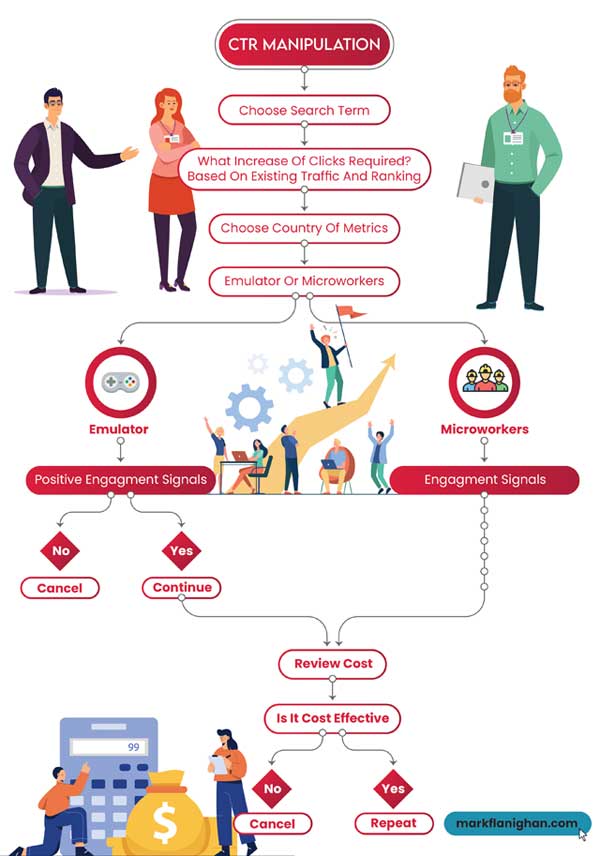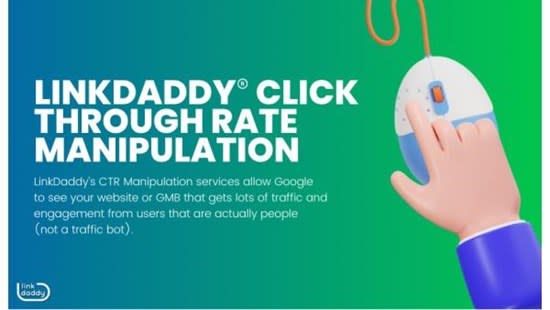Discovering the Partnership Between CTR Adjustment Solutions and Customer Behavior
In the world of digital advertising, the impact of click-through price (CTR) adjustment services on individual actions remains a complicated and intriguing subject. As on the internet systems increasingly count on CTR metrics to gauge the success of content, items, and solutions, recognizing how these controlled prices influence user engagement and decision-making processes is paramount. The interaction between CTR adjustment and user actions increases questions concerning credibility, reliability, and the moral ramifications of such practices. By dissecting the elaborate relationship in between CTR adjustment solutions and customer actions, intriguing understandings arise that might improve our understanding of electronic advertising techniques and their impacts on consumers.
Effect of CTR Control on Habits
Assessing the influence of Click-Through Price (CTR) adjustment on individual habits reveals crucial understandings into the dynamics of online involvement. CTR control involves unnaturally pumping up the number of click a specific link or promotion to deceive users and internet search engine. This method can result in an altered understanding of a webpage's appeal or importance, eventually impacting customer behavior.

Furthermore, CTR control can alter the data utilized by formulas to personalize individual experiences. This can cause users being served material that does not straighten with their preferences or rate of interests, inevitably leading to a decline in individual contentment and engagement. Comprehending the impact of CTR control on individual habits is necessary for maintaining transparency and depend on in on-line communications.
User Engagement With Controlled CTR
Individual interaction with adjusted CTR information often results in skewed understandings of on the internet material appeal and importance. When customers connect with web content based upon unnaturally filled with air Click-Through Fees (CTR), they might think that certain info, items, or solutions are a lot more prominent or credible than they in fact are. This can lead to individuals making choices based upon misleading data, resulting in potentially unfavorable outcomes.
Involvement metrics like sort, shares, remarks, and time invested in a web page are commonly influenced by CTR control. Users might be extra likely to engage with content that shows up to have greater interaction rates, further bolstering the cycle of manipulated understandings. Because of this, web content makers and marketers may focus on creating content that generates high CTR as opposed to focusing on creating truly useful and relevant product.

Psychological Effects of CTR Adjustment

In addition, the emotional impacts of CTR manipulation can also show up in modified decision-making processes. Customers might be a lot more inclined to click web content exclusively based on its regarded appeal, rather than its real value or relevance to their demands. This behavior change can result in a surface interaction with online web content, where customers may forget top notch however much less prominent offerings for those with unnaturally increased CTRs.
Fundamentally, the mental ramifications of CTR control highlight the importance of keeping transparency and credibility go to my site in on the internet interactions to cultivate authentic customer interaction and trust fund.
Honest Factors To Consider in CTR Manipulation
Taking into consideration the ethical effects of manipulating click-through prices (CTR) in on-line platforms is essential for keeping integrity and count on within the electronic ecosystem. CTR control raises issues regarding deceiving customers, distorting information analytics, and compromising the trustworthiness of on the internet material. One significant honest factor to consider is the potential effect on customer autonomy and decision-making. By synthetically pumping up CTR, customers may be misguided right into clicking web links or ads they would not have selected or else, leading to a disingenuous online experience. CTR control can skew the efficiency metrics that organizations rely on to make calculated choices, inevitably affecting market competition and consumer depend on.
Another moral facet to ponder is the fairness of manipulating CTR to obtain an unreasonable benefit over competitors. Participating in such techniques not just breaks principles of fair game however likewise undermines the trust that customers put in why not try here on the internet platforms. It is crucial for organizations and electronic marketing experts to maintain ethical criteria in their methods to guarantee transparency, reliability, and long-term sustainability in the on-line atmosphere.
Implications for Digital Advertising And Marketing
CTR manipulation can lead to skewed data analytics, misdirecting marketers into believing that their campaigns are doing far better than they actually are. When users recognize that CTRs have actually been adjusted, it can erode count on in the brand, leading to long-lasting unfavorable effects for consumer commitment and brand name online reputation.
Additionally, the use of CTR adjustment services can create an unfair affordable landscape, where business that take part in such practices gain an artificial advantage over those that stick to moral advertising and marketing criteria. This can stifle technology and creative thinking in electronic advertising, as success ends up being more about manipulation tactics than delivering genuine worth to customers. Eventually, the ramifications of CTR manipulation for electronic advertising prolong beyond temporary gains, affecting the general sustainability and trustworthiness of advertising efforts in the electronic realm.
Conclusion
In verdict, the connection between CTR adjustment services and user habits is complex and complex. The impact of CTR adjustment on actions, individual involvement with controlled CTR, mental a fantastic read effects, moral factors to consider, and implications for electronic marketing all contribute in shaping this relationship. Comprehending these dynamics is critical for marketing experts and researchers alike in order to browse the ethical effects and optimize the effectiveness of their electronic marketing methods.